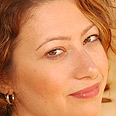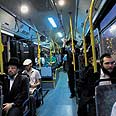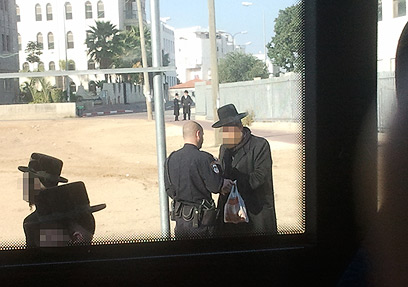

A new front in the fight against women's exclusion from the public sphere in Israel? Transportation Minister Yisrael Katz on Sunday ordered an official investigation into an incident in which a young woman was told to sit in the back of a bus driving from Ashdod to Jerusalem due to haredi protest.
The incident happened on Friday when Tanya Rosenblit, 28, was on Egged bus 451. "I dressed modestly and tried to keep a low profile, but I could tell something strange was going on," she told Yedioth Ahronoth.
Related articles:
- Chief rabbi: Israel isn't haredi land Gender fight reaches buses, billboards
- Gender segregation on rise in Israel
- Op-ed: A Woman of Valor can't be found

Egged bus 451 (Photo: Tanya Rosenblit)
Rosenblit refused. "I wasn't causing any provocation. It's a normal bus and anyone can ride it. I bought my ticket, just like they did and they have no right to tell me where to sit."
Katz said that if it turns out that Egged or the bus driver failed to meet protocol the ministry will apply the full extent of the law on all those who violated regulations.
'Public sphere must be open to all'
The incident fanned the flames of an already heated debate about religious element's growing demand to shun women from Israel's public sphere.
Prime Minister Benjamin Netanyahu said Sunday that fringe groups should not take apart "our common denominator." Speaking at the weekly cabinet meeting he said, "We must maintain the public sphere as an open and safe place for all Israeli citizens."

No one was arrested (Photo: Tanya Rosenblit)
The Israeli society, he said, "Is a complex fabric of Jews and Arabs, Seculars, religious and haredim. Recently we have witnessed attempts to untie our co-existence. We need to look for what beings us together and not what tears us apart."
Finance Minister Yuval Steinitz echoed the sentiment: "Women's exclusion is unforgivable. It will not happen in the State of Israel and I'm sure the haredim will learn to live with that," he said.
Opposition Chairwoman Tzipi Livni also spoke with Rosenblit, telling her she had sent the right message. "There is no doubt that your determination symbols our need to fight and not give up."
Culture and Sports Minister Limor Livnat asked Rosenblit to testify before the inter-ministerial committee formed to examine the matter of women's exclusion.
"I'm proud of you for standing firmly by your principles," Livnat told her.
The incident even prompted Israel's chief rabbis to protest: "This is not the haredi public's country. We have no authority to force our opinions on others," Rabbi Yona Metzger said.
"If we want separation, it's quite legitimate to create a special bus company for certain routes." Rabbi Shlomo Amar told Ynet, "A person can subject himself to a stricter code, but not others."
'We must device a solution'
An Egged statement said: "This was a grave incident in which a handful of haredim attempted to impose their way of life on other passengers. The driver and the female passenger were left defenseless against the onslaught.
"The driver followed protocol. This is a complex situation and it is for State authorities to resolve. Egged's investigation of the incident is still ongoing."
The Transportation Ministry has never actively tried to eliminate the segregation between men and women on buses, especially those earmarked for religion neighborhoods.
Katz has been quoted in the past as saying that "this is an important public that makes frequent use of public transportation. They have a right to be comfortable doing do… But if a relevant solution can't be found, we'll have to issue them private licenses them for public transportation."
The High Court had previously endorsed the Transportation Ministry "voluntary segregation" plan for buses, saying that since the ministry supported the plan, the court found no grounds to reverse it.
Shahar Haselkorn, Attila Somfalvi, Boaz Fyler, Omri Efraim and Shmulik Hadad contributed to this report
- Receive Ynetnews updates
directly to your desktop















